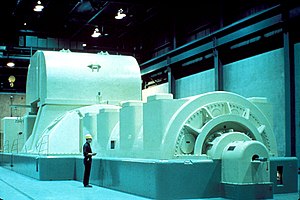
In electricity generation, a generator[1] is a device that converts motion-based power (potential and kinetic energy) or fuel-based power (chemical energy) into electric power for use in an external circuit. Sources of mechanical energy include steam turbines, gas turbines, water turbines, internal combustion engines, wind turbines and even hand cranks. The first electromagnetic generator, the Faraday disk, was invented in 1831 by British scientist Michael Faraday. Generators provide nearly all the power for electrical grids.
In addition to electricity- and motion-based designs, photovoltaic and fuel cell powered generators use solar power and hydrogen-based fuels, respectively, to generate electrical output.
The reverse conversion of electrical energy into mechanical energy is done by an electric motor, and motors and generators are very similar. Many motors can generate electricity from mechanical energy.
- ^ Also called electric generator, electrical generator, and electromagnetic generator.